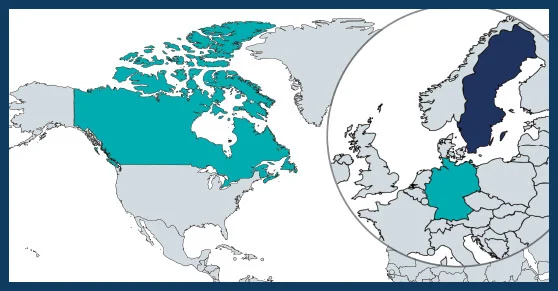12-2018 to 03-2022
€ 1,589,396
Maja Schlüter
maja.schlueter@su.se
Romina Martin
romina.martin@su.se
Stockholm Resilience Centre, Stockholm University, SWEDEN
Lund University, SWEDEN
Université du Québec, Montreal, CANADA
University of Osnabrück, GERMANY
Leibniz Institute of Freshwater Ecology and Inland Fisheries, Berlin, GERMANY

Human life depends on the quality and quantity of freshwater, which is why many stakeholders organise themselves for collaborative management regarding this issue. However, successful collaboration is challenged by high uncertainty about impacts of climate change, the interaction between global and local disturbances affecting freshwater biodiversity, and multiple human activities like farming that appear only indirectly related to freshwater. A prominent example from the past is the accumulation of nutrients in freshwaters from overfertilisation in agriculture and point pollution – leading to dangerous algae blooms and affecting biodiversity. The challenge for managing freshwaters in the future is to develop adaptive strategies that take into account ecological and social changes and visions, as well as their interaction. Processes of learning and anticipation are of utmost importance to inform actors to guide the resilience of ecosystem service provision.
LimnoScenES aims to support freshwater managers in decision-making through the development of future scenarios of biodiversity and ecosystem services useful to manage freshwaters for improved resilience. It will:
1. Estimate freshwater biodiversity and ecosystem services linked to water quality and develop/analyse modelled scenarios;
2.Create participatory scenarios to enable the visioning of maintenance and improvement of biodiversity and ecosystem services under different climate, societal and socio-economic trajectories focusing on transformative learning;
3.Improve the understanding of long-term dynamics which emerge from complex social-ecological feedbacks through management, use and pollution of fresh-water systems.
Based on three case studies in Sweden, Germany and Canada, the project will develop a new generation of social-ecological scenarios by:
1.Improving impact models with integrated global and local stressors, focusing on resilience,
2.Developing stakeholder visions for life close to water, and
3.Model the coupled dynamics of human-freshwater systems.
LimnoScenES will support water managers in developing adaptive measures against stressors from climate change, as well as for managing trade-offs among freshwater-based ES and biodiversity. The consortium will disseminate project results to scientists, stakeholders in the case studies (practitioners, policy makers, and administrators), and the general public through the following activities:
• Blog reports informing about the activities, the case study process, and project results
• An animated video to illustrate long-term dynamics such as eutrophication and restoration formed by social-ecological feedbacks, how they are shaped by climate and institutional change, and play a role in ecological and participatory scenarios in the three case studies such as eutrophication and restoration formed by social-ecological feedbacks, how they are shaped by climate and institutional change, and play a role in ecological and participatory scenarios in the three case studies
• A final project workshop to report back results to the stakeholders from each location, to policy makers from regions facing similar issues, and to stakeholders from the IPBES process.